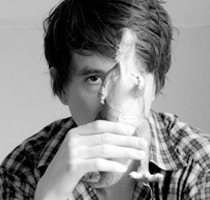A Review of Nick Thran’s Earworm
Spencer Gordon
If I were a poet, I would want my poems to sound and feel like the life I see around me. I would want my work to be vital and new, an affirmation of my emptiness and a sad hymn to happiness. I would fail, most likely, to do so convincingly; life is too big, too absurd, too messy to hobble together in a line or stanza. You can’t blame me for being intimidated. I peer from my urban window and catch a mélange of contradiction: pop songs blasting from passing cars; sparrows scrambling in sunlight; construction workers jack-hammering an alley to pieces; famine on the faces of children in grainy newsprint. What sensibility, what sort of depiction can serve such spectacle? Who am I? How do I work and play and form a responsible contribution to such disorder? And why can’t I get that J-Lo track out of my head?
Tracing the content of this reality (the throbbing urban life that so many of us now inhabit) seems especially important for a collection of Canadian poems. In a blurb on the back of Nick Thran’s sophomore effort, Earworm, David O’Meara describes the book as “side-stepping the more likely subjects” of Can Lit, now so evident to any sensitive reader that they’ve become wretched clichés: the ragged and lonely beauty of the North, spiked with the tortured trees and remote lakes of The Group of Seven; the majesty and fragility of our dwindling natural species; the historical anxieties of a bilingual divide now blossoming into the swirling cacophony of multiculturalism; our enduring inferiority complexes beneath the shadow of colonialism and the neon hush of American dominion. But where is my daily experience? Where are the stories and subjects most suitable to my own fragmented, pop-addled, twenty-first century outlook?
If I were to believe certain critics, the answer can be found in the work of a growing number of Canadian writers, Nick Thran included. By merely avoiding the conventional narratives of our country, Thran’s poetry seems shiny and fun and altogether contemporary. In its better moments, Earworm sounds and feels like the life humming and growing around me; it is unabashedly urban, cheeky, pop-minded, and charismatic. It talks of punk rock, baseball, celebrities, cartoons, and familiar urban landscapes as lovingly and as seriously as it treats the visual arts, classical poetry, aesthetics, and standards of form. It carries a kind of electric glow, a youthful and crackling energy, moving between readers (as Michael Lista describes in The National Post) like a “secret handshake.” As Jeff Latosik suggests in a recent interview for Open Book Toronto, it inspires the sort of fan-boy excitement typically reserved for cool bands releasing long-awaited albums. And while clearly eschewing the clichés of tradition, Earworm does not sound like a protestor’s agenda, nor does it strive so violently against the Can Lit status quo that it risks crying too petulantly against the past, providing too little to stand on for future practitioners. It owes more to New York School lightness, urbanity, wit, and MTV-inspired irony than to Canadian moodiness and anxiety. In addition to thematic concerns, Earworm also boasts a lighter-than-your-average-poetry-book tonal register and range, keeping itself conversational and direct, often dealing with surprisingly rare sentiments of happiness and pleasure. But rather than summarizing further, let’s move to a few examples.
Appropriately, celebrity and the power associated with a name seem essential to Thran’s understanding of the contemporary. In one of the collection’s most talked-about poems, “756*”, Thran assembles a range of public and private responses to Barry Bonds’ monumental home-run record and series of media controversies, using the plural “we” to evoke a sense of community or collectivity. The millions of fans and critics who make up this cultural “we” react to Bonds’ record by “fill[ing] him up” with a spectrum of longing and expectation, expressed as everything from “fictitious baseball works by masters like Roth/ or DeLillo,” to “fake wars, fake breasts, fake reports” and “our loathing,” pinpointing how a larger-than-life celebrity persona is both constructed and consumed by an audience that is simultaneously worshipful and disgusted. In “Found Psalm for Altamont,” the legendary encounter between police officers, Hell’s Angels, and The Rolling Stones at the 1969 Altamont Speedway Free Festival reaches a sort of symbolic, archetypal order through the use of rhyme and Thran’s description of a gang-member as “The Angel.” Personalities from television, music, sports, and film are invoked with jubilant insistence throughout the rest of the book – Adriana Caselotti (“voice of Snow White”), Black Flag, E.T., Ninja Turtles, Pink Floyd, Law & Order, Joe Carter, and the Smurf’s foe Gargamel just a few among them. In Earworm, figures from popular culture become the backdrop and setting for poetry, the source from which a world of symbol, order, and emotion can spring (and one, I would argue, to which a generation of twenty-first century readers can easily relate).
Thran’s first collection, Every Inadequate Name (Insomniac Press 2006), is often lauded for its creative engagement with popular music, and most frequently for the inventive poem, “How Pop Sounds.” In Earworm, I’d argue that Thran goes beyond striving to describe the appeal of pop music and instead attempts to sonically imitate its sweet-sounding addictiveness and directness. This can be at the literal level of quoting pop lyrics, as he does with Tom Waits’ line “You can never hold back spring” in “Aria With a Mirror and No Earplugs” or Bruce Springsteen’s chorus “57 channels and nothin’ on” in the poem “Trigger.” This emulation can also be found at the deeper level of the author’s own rhyming verses; in “Glowworm,” for example, the lines “Miss you. Love you./ Wish you were here” seem as though lifted from any saccharine chart-topper, while “Edelweiss” has the charming rhyme and simplicity of song, with couplets such as “Edelweiss, her favourite flower/ She was sixty-one, dead from cancer” and the closing pair, “it catches the eye./ It’s hard to see it otherwise.” Additionally, Thran’s pop-dedication can find its expression in a kind of radical translation of original lyrics. The poem “Raining in Darling” takes its title and inspiration from a song by Bonnie “Prince” Billy, re-constructing the singer’s confessional lyrics into a conceptual and minimal arrangement bearing little in common with the original.





Excellent article. keep it up!